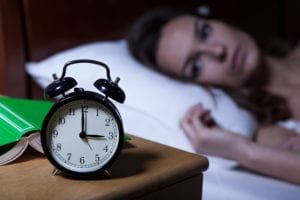Sleep disorders can be caused by a number of factors, but many people’s sleep troubles are directly related to their drug or alcohol use. Prescription and non-prescription medications, illegal drugs and alcohol all have the potential to cause sleep problems, and the severity of these problems will vary from person to person.
The most effective way to combat a substance-induced sleep disorder is by addressing the underlying drug or alcohol addiction; however, a number of therapeutic techniques can help individuals ease their symptoms and get a better night’s sleep.
Substance-Induced Sleep Disorder Facts
“Substance-induced sleep disorder” is a term used to describe drug or alcohol-related conditions that may resemble effects of true sleep disorders such as insomnia. To be diagnosed with a substance-induced sleep disorder, a person must exhibit symptoms that interfere with their normal daily functioning and require medical intervention.
The sleep issues must clearly stem from substance use: they must occur either during a period of intoxication or within 30 days of a period of substance use. People who try to alleviate their sleep troubles with alcohol or drugs often find themselves trapped in a cycle of substance abuse and sleeplessness.
For example, a person who drinks to fall asleep will likely experience poor sleep quality. As a result, they may consume more alcohol in an attempt to get relief.
Understanding the Symptoms
There are multiple types of substance-induced sleep disorders, and each one involves a unique set of symptoms. The four main types include:
- Insomnia: Difficulty falling and/or staying asleep
- Parasomnia: Night terrors and sleepwalking
- Daytime sleepiness: Fatigue and diminished alertness during the day
- Mixed: Any combination of the above types
Sleep Tips and Solutions
When an individual struggles with both substance abuse and sleep problems, prescription medication is rarely recommended as a treatment option. Many drug and alcohol rehab programs include cognitive-behavioral therapy (CBT) in their treatment plans. CBT has shown to be effective in the treatment of insomnia.
In cognitive-behavioral therapy sessions, clients begin understanding why they’re having trouble sleeping. In addition to substance abuse, other key factors may include caffeine consumption, anxiety or even a person’s nightly routine. CBT also helps clients change their expectations about sleep. Some clients find that they had unrealistic ideas about how much sleep their bodies actually need to function properly.
Biofeedback offers another way of treating sleep difficulties without the use of medication. Biofeedback helps participants recognize and become able to control some of their body’s physical responses.
Dealing with a substance-induced sleep disorder can be difficult. You might feel like you can’t handle another sleepless night. The good news is, you don’t have to continuing living this way. If you’re struggling with drug or alcohol abuse, help is available.











